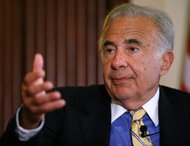Mr. Ballmer, who joined Microsoft in 1980, will be departing a company that is very different from the fearsome software giant of the 1990s. During his tenure as chief, the company has failed to capitalize on some of the most important tectonic shifts in technology, including the rise of mobile devices and Internet search.
Mr. Ballmer also watched as Apple, an old nemesis that nearly went bankrupt in the late 1990s, and Google, which didn’t even exist until then, have soared.
As chief executive, he has faced regular calls for his ouster from investors and analysts in recent years because of the company’s missteps, and in fact Microsoft’s stock — which has languished for most of his tenure — rose 6 percent on the news Friday.
But Microsoft said the decision to leave the company was entirely Mr. Ballmer’s.
“There is never a perfect time for this type of transition, but now is the right time,” Mr. Ballmer said in a statement.
Mr. Ballmer, 57, will stay on until a successor is chosen by a special committee of the board that includes John W. Thompson, the board’s lead independent director, and Mr. Gates, Microsoft’s chairman. The committee will consider both internal and external candidates and has hired an executive search firm to scout for a replacement.
Earlier this year, Microsoft announced a major restructuring aimed at making the company more nimble and less prone to infighting. Mr. Ballmer has said the shake-up will help remake Microsoft into a “devices and services” company, one that pays greater mind to blending its software with hardware — and, in some cases, makes devices itself.
Mr. Ballmer said that he was leaving earlier than planned because he believed the company needed an executive who would remain well beyond that transition.
“My original thoughts on timing would have had my retirement happen in the middle of our company’s transformation to a devices and services company,” Mr. Ballmer said. “We need a C.E.O. who will be here longer term for this new direction.”
The fact that Mr. Ballmer announced his plans without a successor in place was puzzling to many observers in the technology industry.
The disappointing stock performance may have been a factor. This year, a hedge fund called ValueAct, known for behind-the-scenes shareholder activism, began acquiring a small stake in Microsoft. Some analysts say they believe other shareholders might have been willing to join with the fund in efforts to lobby for management changes at the company.
Some analysts speculated on Friday that Mr. Ballmer announced his retirement early to buy time to find a successor without the distraction of a fight with shareholders.
Microsoft’s financial performance in the coming quarters could also have amplified calls for a leadership change at Microsoft.
The company posted disappointing results in its most recent quarter as its venerable Windows business showed signs of succumbing to a broader slump in personal computer sales. Microsoft also disclosed an embarrassing $900 million charge to cover its unsold inventory of Surface tablets, the company’s answer to the iPad.
Most forecasters are predicting that P.C. sales will continue to decline for the foreseeable future as consumers opt instead to buy tablet computers and smartphones.

Article source: http://www.nytimes.com/2013/08/24/technology/ballmer-announces-retirement-from-microsoft.html?partner=rss&emc=rss

